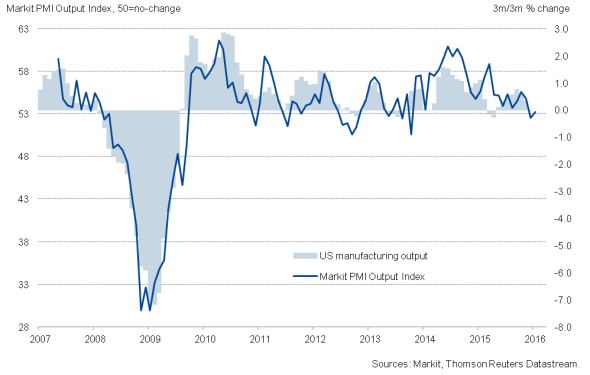Customer Logins
Obtain the data you need to make the most informed decisions by accessing our extensive portfolio of information, analytics, and expertise. Sign in to the product or service center of your choice.
Customer Logins
ECONOMICS COMMENTARY
Feb 18, 2016
US manufacturing output rises for first time in three months
A rebound in official industrial production data in January brings welcome good news on the US economy. Industrial output rose 0.9% in January, according to the Federal Reserve. It was the first increase in six months and the strongest rise since November 2014. Growth in January could have been even stronger, with the Fed noting that "A storm late in the month likely held down production in January by a small amount".
The data add to hopes that US industry is slowly recovering some of the ground it had lost throughout much of last year. On a monthly basis, industrial output increased only once last year (0.8% in July), with a strong dollar and waning global demand dragging on the sector.
Sharp declines in mining and utilities accounted for much of the downturn in industrial production in previous months. In January, however, utilities output surged 5.4%, with the return of normal winter weather boosting demand for heating, according to the Fed. Meanwhile, mining output was flat, following declines in each of the previous four months.
Manufacturing production was up 0.5% in January, the largest monthly gain since July 2015. However, that still left manufacturing output flat in the latest three-month period. Markit's US PMI had correctly anticipated this slowing in factory performance, with the headline PMI falling to a 38-month low in December, before recovering some ground in January.
US manufacturing output and the Markit PMI

Markit's US PMI Output Index historically exhibits a good correlation (92%) with the Fed's gauge of manufacturing production (as measured by the three-month growth rate). The correlation against industrial production data is slightly weaker. However, the industrial production numbers from the Federal Reserve include output from mining and utilities, which are not covered by the PMI. These sectors can be highly volatile and weather dependent (especially utilities).
While there remain some downside risks to economic growth, including the strong dollar, slow exports and weak global demand, the industrial production numbers follow strong retail sales and labour market data, thereby adding to signs that the Fed will continue to raise rates this year.
A next hike in March, however, seems unlikely. In the minutes from its January meeting the Fed stated that "uncertainty had increased" since rates were hiked in December and that although the labour market had been stronger than expected, "the spending and production data generally had been disappointing". The meeting took place, of course, before industrial production data for January were released.
Flash manufacturing PMI data, published on 22nd February before flash services PMI numbers on the 24th, will provide further insight into the economy's performance in the first quarter.
Oliver Kolodseike | Economist, Markit
Tel: +44 14 9146 1003
oliver.kolodseike@markit.com
{"items" : [
{"name":"share","enabled":true,"desc":"<strong>Share</strong>","mobdesc":"Share","options":[ {"name":"facebook","url":"https://www.facebook.com/sharer.php?u=http%3a%2f%2fwww.spglobal.com%2fmarketintelligence%2fen%2fmi%2fresearch-analysis%2f18022016-Economics-US-manufacturing-output-rises-for-first-time-in-three-months.html","enabled":true},{"name":"twitter","url":"https://twitter.com/intent/tweet?url=http%3a%2f%2fwww.spglobal.com%2fmarketintelligence%2fen%2fmi%2fresearch-analysis%2f18022016-Economics-US-manufacturing-output-rises-for-first-time-in-three-months.html&text=US+manufacturing+output+rises+for+first+time+in+three+months","enabled":true},{"name":"linkedin","url":"https://www.linkedin.com/sharing/share-offsite/?url=http%3a%2f%2fwww.spglobal.com%2fmarketintelligence%2fen%2fmi%2fresearch-analysis%2f18022016-Economics-US-manufacturing-output-rises-for-first-time-in-three-months.html","enabled":true},{"name":"email","url":"?subject=US manufacturing output rises for first time in three months&body=http%3a%2f%2fwww.spglobal.com%2fmarketintelligence%2fen%2fmi%2fresearch-analysis%2f18022016-Economics-US-manufacturing-output-rises-for-first-time-in-three-months.html","enabled":true},{"name":"whatsapp","url":"https://api.whatsapp.com/send?text=US+manufacturing+output+rises+for+first+time+in+three+months http%3a%2f%2fwww.spglobal.com%2fmarketintelligence%2fen%2fmi%2fresearch-analysis%2f18022016-Economics-US-manufacturing-output-rises-for-first-time-in-three-months.html","enabled":true}]}, {"name":"rtt","enabled":true,"mobdesc":"Top"}
]}



